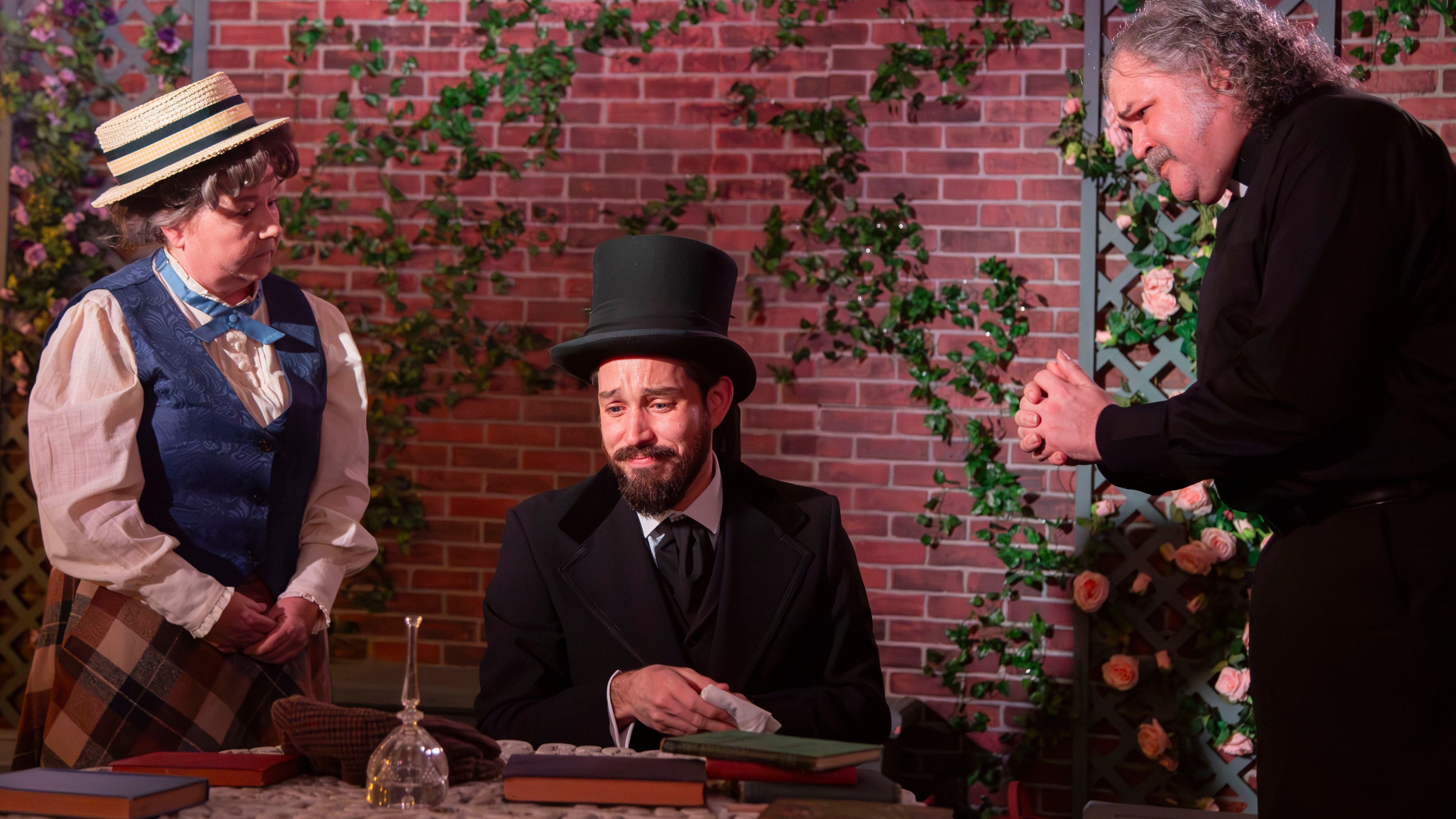“I hope you have not been leading a double life, pretending to be wicked and being really good all the time,” Cecily (Ella Noel) tells Algernon (Nick Medina) in The Importance of Being in Earnest. “That would be hypocrisy.”
Hypocrisy—and just plain lying—flow freely in Oscar Wilde’s 1895 farce where nearly every line is served with an exquisite twist of irony. Experience Theatre Project’s production, directed by Alisa Stewart (the company’s artistic director), adds extra zing to this witty cocktail by presenting Earnest not in a theater but in the Beaverton Masonic Lodge, home to the town’s fraternal organization of Freemasons.
To transform the 1932 Masonic building into a world of Victorian wealth, set designer Megan Wilkerson cleverly created three spaces—a London flat, plus a country house and its garden—that the audience gets to enter in this immersive show. It’s akin to a tour of Pittock Mansion, albeit one where actors perform one of the wittiest plays ever written in English and audiences are allowed to touch (and even sit on) the furniture.
The play begins in the London apartment, which is furnished with elegant settees and patterned rugs covering the lodge’s linoleum tiles. Into this space, Algernon, wearing a velvet burgundy jacket, sweeps in, evoking Wilde himself as he exchanges insouciant quips with Jack (Brave Sohacki).
“If I am occasionally a little overdressed,” Medina says with just the right note of impishness, “I make up for it by being always immensely overeducated.”
Jack, who calls himself Ernest when he’s in town and Jack when at his country manor—which he shares with his young ward, Cecily—is courting Algernon’s cousin, Gwendolen (Kate Herrell). The play proceeds in promenade style, which means that when Gwendolen follows Jack to the countryside, the audience hears a steam whistle and a conductor beckons them across the room and into a long narrow space that serves as the train.
Sound designer Annalise Albright Woods has also added the sound of chugging wheels as the train picks up speed, while at the head of the line, the conductor bobs around as if he’s actually standing inside a lurching vehicle.
Once the train “arrives” in the country, the audience steps into Jack’s garden, where invisible birds are singing and the pink roses growing on the trellis mirror the floral print on Cecily’s gown. Sitting on chairs and benches arranged near a set of ornate white patio furniture, the audience is close enough to the actors to admire the details of the splendid costumes (designed by DeMara Cabrera), including the creamy shimmer of a hat perched on Gwendolen’s brunet coiffure.
Throughout the performance, subtle gestures and vocal nuances, which might be lost on a traditional theater stage, are also more noticeable in this intimate setting. It’s amusing, for example, to hear Lady Bracknell (a superb Saren Walsh), who’s a self-proclaimed bastion of Victorian manners and morality, register her disapproval of Jack by making a small growl.
In a script that’s already loaded with wit, the unconventional production style adds other surprises, such as Algernon’s white-gloved butler (Laurence Cox) maintaining a deadpan expression as he neatly steps between two audience members or Jack squeezing onto a couch next to a couple already seated there. One audience member even contributed to the sly humor by stashing their San Francisco 49ers ball cap beneath their chair in Algernon’s flat, adding a note of absurdity that Wilde himself might have appreciated.
Wilde was a proponent of aestheticism, dismissing moralizing narratives in favor of art for art’s sake. Contemporary audiences, though, can’t help viewing Earnest in a different light, knowing that just three months after the hit play opened, a judge sentenced its author, who is today revered as a gay icon, to two years of prison and hard labor in the name of “decency and morality.”
In five years, Wilde, by then an outcast, would die impoverished in a Paris apartment at the age of 46. One of the pleasures of Experience Theatre’s production is that it transports us back to a time when his work was the toast of the town and the applause for his artistic genius seemed as if it would never stop.
SEE IT: The Importance of Being Earnest plays at the Beaverton Masonic Lodge, 4690 SW Watson Ave., experiencetheatreproject.org. 7:30 pm Friday-Saturday and 2 pm Saturday and Sunday, through Feb, 25. $5-$59.
